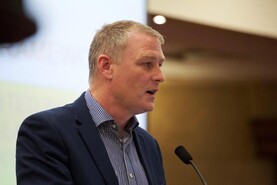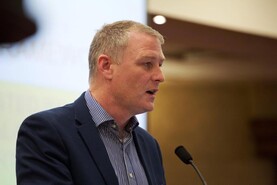Eddie Punch faces an uphill task to get elected to the European Parliament from Ireland’s South constituency if the opinion poll published this weekend is to be believed.
If he is to make a surge, he would be following in the illustrious footsteps of TJ Maher, who represented the people of Munster in Brussels and Strasbourg for 15 years.
I say Brussels and Strasbourg because the European Parliament actually sits in two separate buildings, one the Espace Leopold in Brussels, the other 420km away in Strasbourg, on the French side of the border with Germany in the historic Alsace region.
For most of the month, the 705 MEPs are located in Brussels, adjacent to the Berlaymont building that houses the European Commission.
However, once a month, they relocate to Strasbourg, for the plenary sessions where voting takes place. Meanwhile, a significant chunk of the Parliament’s secretariat are located in Luxembourg.
Horse trading
It’s all part of the horse trading that took place at the founding of the European Economic Community (EEC) in the 1950s between the six original member states. Luxembourg also got the European Court of Justice.
I’ve never been in Strasbourg, but I have seen the large metal boxes outside the hundreds of MEPs' offices, full of documents loaded to be transported by a fleet of lorries to Strasbourg.
Does it make any sense? Not to me. I’m sure that the tsunami of paper has reduced over the years, as the laptop has supplanted the printer and fax machine, but the carbon footprint of maintaining two separate parliamentary forums is still I’m sure significant.
Europe’s lawmakers are fairly quick to tell the rest of us, especially farmers, to bite the bullet and make structural changes to minimise our impact on the environment.
But one week a month, as the hundreds of apartments in Brussels remain empty and the hotels of Strasbourg are packed to the rafters, they seem to be putting two fingers up to the rest of us and saying “do as I say, not as I do”. It’s hardly leadership.
Smaller fields
Anyway, I digress. In 1979, the EEC held the first direct elections to the parliament. Back then, it was a nine-nation community and Ireland was awarded 15 of the 410 seats. Four of these went to Dublin, three each to Leinster (Dublin excluded) and Ulster/Connacht, while Munster got five.
The fields were much smaller than they are today. There were 46 candidates, compared with the 73 currently fighting for a seat less in a constituency fewer.
Thirteen of these were in Munster. Fianna Fáil and Fine Gael fielded most of these. Fianna Fáil had five candidates, one for each seat! Fine Gael for its part had four, with Labour, Sinn Féin, The Workers Party (which morphed into the Workers Party, most of whom left to form Democratic Left before amalgamating with the Labour Party) and the Community Democrats providing one candidate each.
His decision to run as an independent came as a surprise in many quarters
There was only one independent candidate - TJ Maher. The Tipperaryman had risen to national prominence as one of the leaders of the National Farmers' Association's (NFA) farmers rights campaign in 1966.
The following year, he was elected president, succeeding Juan Greene. Under his stewardship, the NFA evolved into the Irish Farmers' Association (IFA) and strongly supported Ireland’s entry into the EEC in the 1972 referendum.
The IFA set up a Brussels office, recognising from the start that Irish farming’s strategic interests would be decided there.
Having completed nine years in office, making him the longest serving IFA president (a record that will never be broken unless the current maximum four-year term is overturned), Maher became president of the Irish Co-operative Organisation Society (ICOS) in 1977, still at the forefront of agri politics.
Even so, his decision to run as an independent came as a surprise in many quarters. Taking on the big two parties in rural Ireland was not simple, their grip was firm.
Maher would have to gain the farming vote ahead of Fine Gael candidate Alan Dukes, who was well known to farmers as the IFA’s economist and had served in that Brussels office Maher had helped create.
Topping the poll
On the day, the vote was decisive. Maher topped the poll with a whopping 86,208 votes - 20% of the first preference vote. He had 15,000 of a surplus over the 71,766 quota.
It was the beginning of a 15-year stint in the European Parliament, a period when Europe changed beyond recognition.
The accession of Greece in 1981, then Spain and Portugal five years later, moved the centre of gravity of the EEC southwards. That same year (1986), Mikhail Gorbachev emerged as the Russian leader and the atmosphere across the continent began to change significantly.
The Berlin Wall came down in late 1989 as the Iron Curtain fell across eastern Europe, the so-called Soviet bloc.
By the time TJ Maher retired in 1994, preparations for the accession of Austria, Finland and Sweden to the European Union were well under way.
The Maastricht Treaty had seen the EEC evolve into the EU in 1992. It was a decade and a half of tumultuous change.
Through it all, TJ Maher remained as committed a European as he was an Irish nationalist (small n); the two positions could and did co-exist.
Maher ran once for domestic election, in Tipperary South in 1981. He failed to take a seat. One of the four TDs elected was Carrie Acheson, the voice of the National Ploughing Championships, who passed away last year.
However, he was unbeatable in the European hustings, retaining his seat in 1984, when he again topped the poll. His vote had dropped to 60,138, but turnout was way down, from almost 70% to just over 50%.
In 1989, he was third after the first count, with 55,000 votes, and retained his seat without much drama.
His farming vote base was split by the presence of Paddy Lane, who had succeeded Maher as IFA president, on the Fianna Fáil ticket. Lane was also elected. A third IFA president, Alan Gillis, was subsequently elected to the European Parliament in 1994.
So there is a strong history of farmer leaders being elected to serve in Brussels/Strasbourg. Eddie Punch, of course, like Alan Dukes, was an executive representing farmers, rather than an elected leader.
Will he prove the polls wrong? We’ll know in three weeks and however long the count takes, with 23 candidates, it won’t be quick.






 This is a subscriber-only article
This is a subscriber-only article










SHARING OPTIONS: